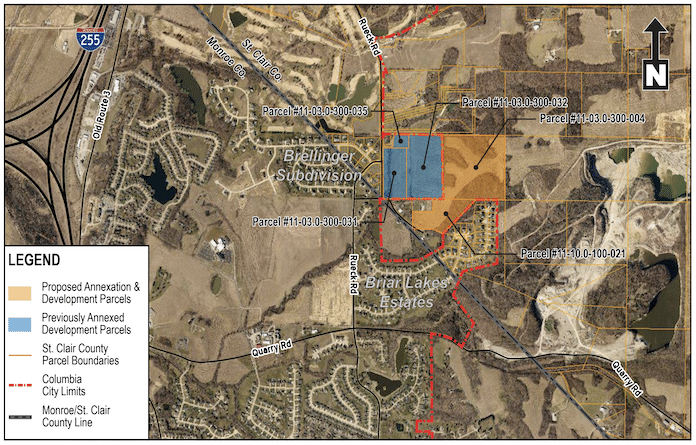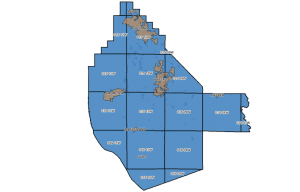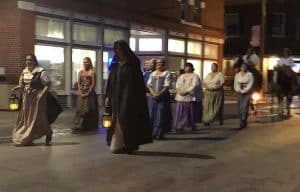Columbia annexation aggravation

The Columbia City Council met for more than three hours in regular session on July 6. Nearly one third of that time was dedicated to discussion of a proposed annexation agreement and subdivision plan in the northern part of the city.
A number of Columbia residents from the Brellinger, Briar Lake Estates and Hoffmann Estates subdivisions near Rueck Road north of Quarry Road were on hand to express displeasure regarding a proposed annexation and zoning agreement and future subdivision development near their neighborhoods.
At its June 14 meeting, the Columbia Plan Commission voted to recommend approval of annexing approximately 54 acres of property in unincorporated St. Clair County and having the land zoned R-3 to match 40 previously annexed acres in the proposed 94-acre development area.
The developers of this project are Thomas Reid III and Herbert Frentzel of Wild Oak LLC.
When discussed at the June 21 city council meeting, several aldermen and Columbia Mayor Bob Hill voiced concerns about the plan. Columbia Director of Community Development Scott Dunakey on July 6 presented a revised draft to address the issues – including access to Rueck Road, masonry requirements and street light spacing requirements, among others.
More than a dozen residents spoke on potential problems with the plan, including water drainage, traffic, zoning, use of a bridge near Hoffmann Estates as emergency access, adherence to the city’s master plan and other perceived trouble with the development as proposed.
Several residents noted that recent rainfall had flooded parts of Quarry and Rueck roads near the current subdivisions, leading to questions about how water drainage from additional residences would affect the area.
Resident Brad Mutza expanded on water concerns, pointing out that the area of the proposed development is severely sloped in places and residential water and storm water drainage would be a “problem.” He added that pushing water uphill and increased water usage would also create water pressure issues, especially during peak water use times.
Dunakey clarified that the city council would only be voting on the annexation and zoning of the property and any engineering or infrastructure concerns would need to be addressed before the final plan would be approved. He also noted there was an area in the proposal designated specifically to collect runoff water.
Another major concern of those who spoke at the meeting was the R-3 zoning request by the developer. Several people expressed a desire to “maintain low density” residency requirements, as the surrounding R-2 zoned subdivisions have larger lot size and setback regulations than R-3 parcels.
Dennis Brand, developer of the Brellinger subdivision, noted that he and those who planned Briar Lake and Walnut Ridge all “followed the rules” regarding zoning and road improvements in the area. Brand asked the council follow the city’s “master plan,” which specified low-density residency in the area.
Area resident Mark Scoggins echoed Brand’s opinion, saying “you either have a master plan or you don’t … If it’s approved as R-3 you might as well tear that master plan up because you can’t refuse anyone else” who may ask for development outside of the plan’s framework.
Columbia Ward III Alderman Paul Khoury noted he would be hesitant to vote for something that went against the city’s master plan, but Dunakey pointed out the previously annexed parcels in the proposed plan are already zoned as R-3 residential lots.
Dunakey added that while the city could not change zoning unilaterally, it could ask the developer to consider changing the R-3 zoned and requested annexation properties to all R-2 zoning as a way to promote council’s approval of the annexation proposal.
Brand and others also took issue with the idea that one specific road and bridge in the area could be used as access for emergency vehicles.
One resident said she was hesitant to walk on the bridge, saying she could put her foot through some gaps in the bridge and that she did not feel it could handle the weight of a fire engine.
Brand concurred and stated the development would need at least two new entrances from Rueck Road instead of the single entrance in the current plan.
Bruce Hoffmann, who grew up on the farm that was once on the land in question, agreed that new entrances would be necessary if the development were approved. He also stated that he and his brother were unaware the land would be sold for subdivision development when he and his brother sold the land to an adjacent property owner and apologized to residents at the meeting for the worry this proposal has caused.
After more than an hour of public comment and discussion, Dunakey said he and Columbia City Administrator Doug Brimm would take the residents’ concerns into consideration and would draft a new plan for further discussion and review.
Also on the agenda was a discussion about Columbia’s liquor code, which also includes video gambling ordinances.
Hill explained that he wanted to review the ordinance for possible amendment to put a limit on the amount of licenses the city provides for gambling machines and parlors.
“I don’t think it fits to have gaming parlors and machines throughout Columbia like in other municipalities,” Hill said.
The issue had been raised during a city council meeting in October 2020, but no action has yet been taken to officially cap or restrict video gambling in the city.
Brimm clarified the previous discussion, stating that they had decided to “let the free market essentially decide the number of video gambling establishments the city could support.”
He noted the regulations that were in place based on liquor versus gambling revenue were not easily enforced.
Dunakey clarified by pointing out the city’s two categories of liquor licenses that had limits included were not actually required by establishments that have gambling, thereby nullifying any limiting factors.
Hill confirmed the limits he sought would not be based on population, but on a number the city believes would be appropriate.
“I just don’t want to see gaming parlors popping up or gaming in every establishment in Columbia,” Hill continued. “It’s not what I envision Columbia to be.”
Brimm noted that the city currently has three “true parlors” under what previous provisions attempted to establish relating to liquor and gambling revenue ratios.
Under Hill’s advisement, Brimm said an ordinance would be drafted for consideration to limit gambling licenses issued by the city – specifically at businesses that provide on-site liquor consumption.
Another item discussed was a “proposed sanitary sewer extension program,” presented by Columbia City Engineer Chris Smith.
Smith gave background on the project, which has been “roadblocked” for a variety of reasons for some time and prohibits developing “anything to the east” of the city.
Major properties that would be serviced by the sewer extension would be 480 acres of future residential properties, 20 acres of commercial use property and 75 acres of Columbia School District land.
Smith added that a new pump station would need to be added “at a significant cost” of around $500,000, but he and Dunakey gave scenarios to the council that would eventually make the project “zero cost” to the city.
Dunakey explained he and Smith were seeking the council’s guidance for proceeding before taking time to develop more specific plans.
Smith said the next step will be to speak with stakeholders in the area for input.






